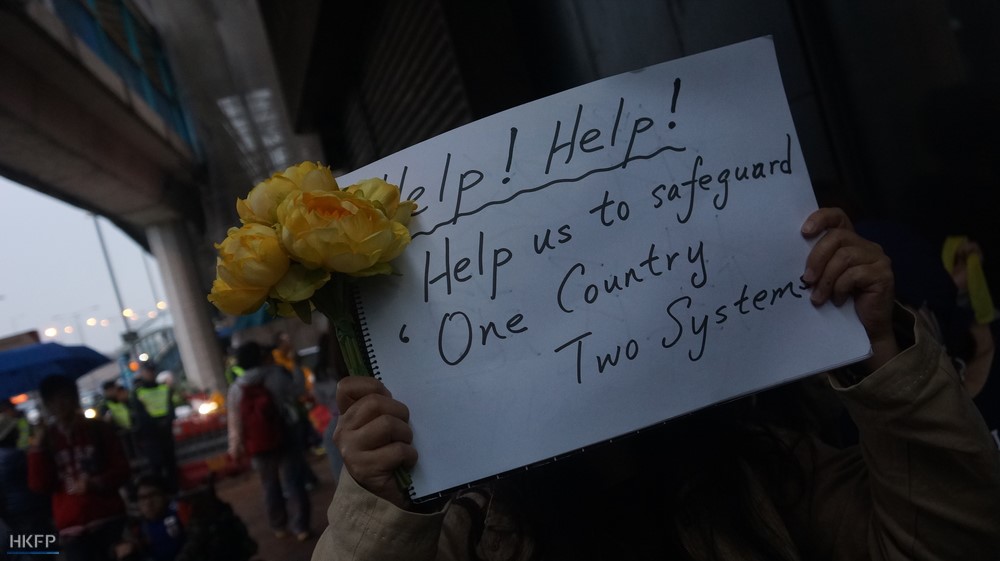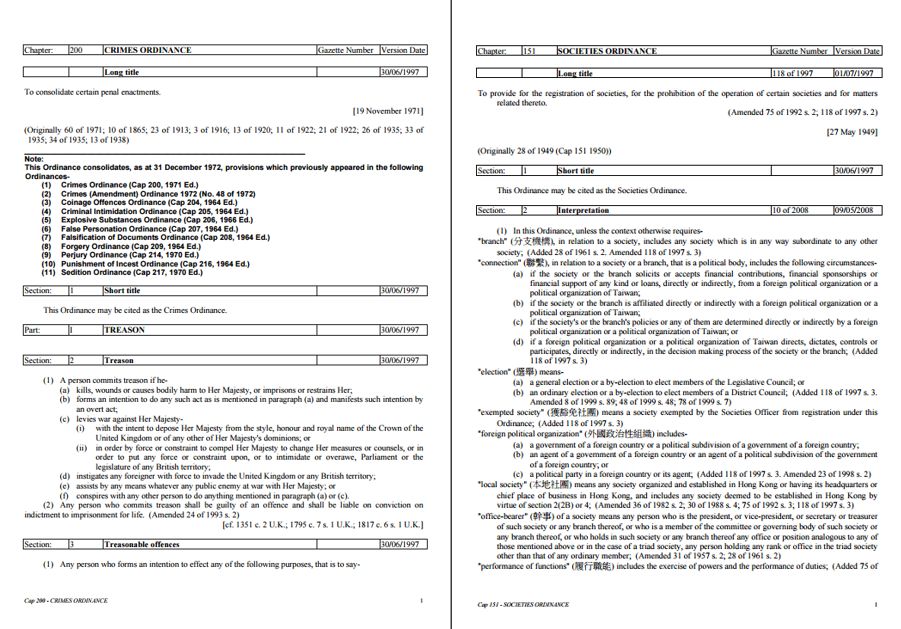There are times when the line emanating from the Liaison Office becomes crystal clear because every toady and sycophant in Hong Kong is parroting it. This is one of those occasions. The line is that some means should be found swiftly which will land the prophets of independence in court and preferably behind bars. Quite how this is to be achieved has been entertainingly variable. Different left-wing lawyers (how did these people pass their exams?) have trekked through the legal undergrowth in the hope that there is a trap hidden there somewhere.
At various times, these experts, and their lay followers, have pounced with cries of triumph on the Preamble to the Basic Law, on Article 1, on sundry other articles, on the parts of the Crimes Ordinance which deal with treason, and the parts which deal with sedition. The rather desperate suggestion was made that the independence advocates could be prosecuted under the Societies Ordinance because the police have apparently so far refused to register them. Still to come, no doubt, is the possibility of a prosecution for dishonest access to a computer.

Now look, dimwits, one of the things we were promised would remain the same after the handover was that Hong Kong people would continue to enjoy freedom of speech. Freedom of speech does not comprise just the freedom to say what everyone else agrees with. It must also include the right to be unusual, or indeed outrageous. Freedom of opinion, as a judge once put it, must include the freedom of opinions which we despise. The Basic Law has a variety of interesting things in it, but they do not include a commitment to eternity.
There is, in fact a mechanism for changing it. We must therefore suppose that there is an implicit right for people to discuss the sort of changes which they would like. Independence may not be a very practical suggestion but it is not in itself so dangerous that merely uttering it should be a criminal offence. The answer to erroneous speech is more speech. Nobody can object to people saying in public that independence is impractical and undesirable. Attempting to put the word on a par with pornography or libel is outrageously repressive. It has been suggested that the mere existence of an independence party in Hong Kong would impair China’s security. Nonsense. “Security” is one of those words like “discourse” and “inappropriate” that have my bullshit detector ringing merrily. It is not an expression of thought but a substitute for it. No doubt the existence of such a party would be rather embarrassing. Tough.

Actually it would be a great help if people could abandon the idea that this is a legal problem. It isn’t. People who have been reading my ramblings for a while will recall the observation that the SAR government should not regard the end of Occupy as a problem solved. People who found that non-violent protest on a large scale was ignored would explore other avenues, which the powers-that-be might find even less welcome than a tented village outside the Legco palace. Some of them are exploring the possibilities of conventional politics, some are exploring the possibilities of violence, and some are exploring the possibilities of drastic constitutional change.
The answer to these explorations is to show not that our paramilitary police are wonderful, but that the system can deliver what people want. If our government is determined to stay in a dream world of its own devising, then jailing a few dissidents is not going to help. In fact if I were trying to found an independence party I would be hoping very much that I would be arrested. The person who is prosecuted for the cause will become an instant hero. The church, as they used to say, is fertilized by the blood of its martyrs.

It is time the government put a stop to the bureaucratic guerrilla warfare with independence seekers which just encourages them and inspires their supporters. If it is obvious that independence is a “dead end” then there is no need for such dubious skullduggery as censoring people’s election leaflets, refusing to register their societies or dreaming up pretexts for nakedly political prosecutions. Another good idea would be to stop expanding the “independence” movement by putting people in it who don’t belong there. Asking for self-determination is not the same thing as asking for independence. People may self-determine that they do not wish to be independent. Asking for freedom of choice is not the same thing as advocating a particular outcome. People who oppose bans on smoking are not advocating smoking, they are advocating choice. Likewise with self-determination.
The hysterical reaction to independence parties is an interesting example of failing to get the point. The point is that we were promised that Hong Kong would as a Special Administrative Region be allowed to decide by itself about matters other than defence and foreign affairs. Maybe that was sincerely intended at the time, but it is not what is being delivered now. If we had a government which could credibly claim to put local interests first there would be no problem. People who now advocate independence have given up hope in the present arrangements and drawn an unusually rigorous conclusion. Do not assume that nobody shares their despair, even if they draw other conclusions from it.
